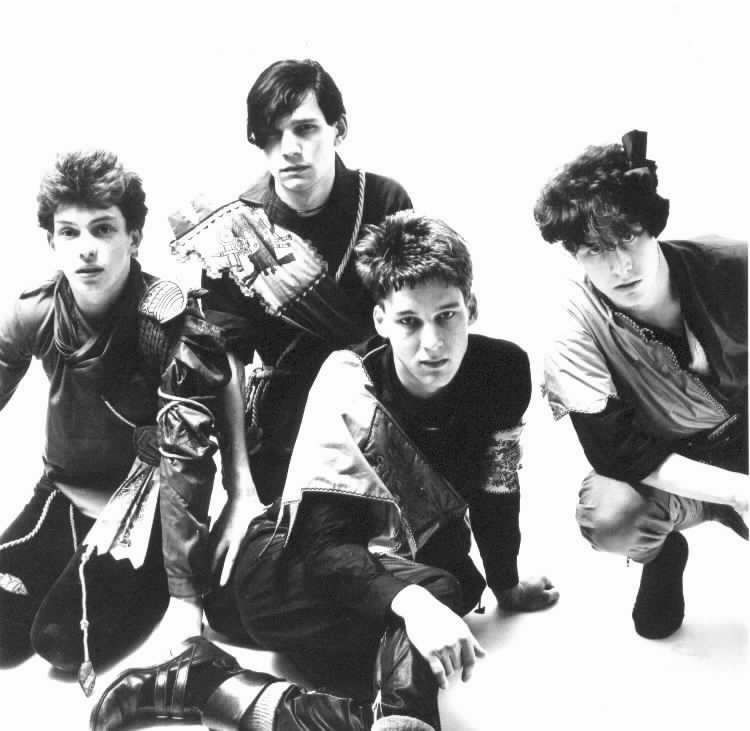Bursting out of the Edinburgh punk scene of the late ’70s, Scars were a potent mix of youthful aggression and serious songwriting chops.
Their debut single Horrorshow – a double A-side with the equally striking Adult/ery (sic) – was a typically ambitious take on Anthony Burgess’ futuristic nightmare A Clockwork Orange.
Dripping with Nadsat and an adroit, off-kilter bass line, it was subsequently hailed by Douglas MacIntyre of Scottish indie label Creeping Bent as Scotland’s Anarchy In The UK.
An Ideal For Living Great Moment In Music, it features an unsettling, bending guitar line that would provide a signature for post-punk.
“It didn’t just happen by accident,” Paul remembers. “I wanted to drill the guitar through your eyes into the back of your head.”
The band were signed by an affiliate of major label Charisma Records and recorded two sessions for John Peel.
But, like The Pistols, their initial career was brief as the band split after just one album Author! Author! released in 1981.
And for several years that was it, Scars seemingly destined to remain a footnote in the annals of Scottish alternative rock.
Then in 2005 Lemon Jelly sampled Horrorshow on their Shouty Track single from the album 64-95, paving the way for the rediscovery of the group described by The Guardian as The Last Great Lost Band.
Matt Catchpole asked Scars founder and lead guitarist Paul Mackie, aka Paul Research, about the band’s enduring influence and his new ‘supergroup’ VoiceX.

Part of a scene centred around the Tap o’ Lauriston pub in Edinburgh, Scars were formed in 1977, by Paul and brother John Mackie.
“I went into my brother John’s room, where he was practising guitar and asked him to switch to bass. The rest of the story is told on the Scars mini-documentary.”
Paul is referring to The Story Of The Scars a short film directed by Grant McPhee in the run up to the band’s one-off reunion gig in 2010, but more of that later.
Frontman Robert King and drummer Calumn Mackay were quickly recruited via an ad in Hot Licks music store in Cockburn Street.
Paul says Scars were originally influenced by bands from the glam era, particularly David Bowie.
“Look at the cover versions we played: Mick Ronson, Alex Harvey, Cockney Rebel. My first records were Look Wot U Done by Slade and Jeepster by T-Rex. Oh, and Without You by Nilsson.
“But the biggest influence was and is David Bowie. That goes way beyond music though. Bowie’s like my life coach. He’s a religion to me.”

The real trigger for the explosion in Scottish alternative rock was the emergence of the punk scene across the border led by The Sex Pistols and The Clash.
According to the documentary Big Gold Dream, it was The Clash’s show at the Edinburgh Playhouse on 7 May, 1977 that provided crucial impetus.
“The Scars were already a band at that point. We started in February 1977, but that show put punk on the map and helped a lot of like-minded people find each other,” Paul explains.
Besides Scars, bands like The Cubs and Fire Engines in Edinburgh and Postcard label luminaries from Glasgow like Orange Juice and Josef K began to garner national attention.
Scars double A-side debut came out on Fast Product – an uber cool label which released early tracks by The Human League, The Gang of Four and Joy Division.
While he disputes Joy Division’s exact relationship with Fast, Paul admits he was a major admirer.
“People say they were on Fast, they weren’t really. But they were so amazing, Saw them play at Heaven. It was good, but to be truthful having a three-way conversation with Paul Morley and Kelly [Johnson] from Girlschool was what made it a truly memorable night.”

Scars would come to regret the terms of their deal with Fast, which to this day means they have no control over perhaps their most famous song.
“We signed a contract with Fast Product allowing them exclusive rights to those recordings ‘in perpetuity’ – that means forever,’ says Paul bitterly. “They just love sticking up two fingers to us.”
By the time it came to recording the album, Scars were beginning to blend their brittle post-punk with a more danceable, commercial sound – aided by new drummer Steve McLaughlin.
The band’s image was also evolving, their dress sense reflecting that of the emerging New Romantic scene.
So hip were they becoming that Issue 3 of fashion and culture bible ID magazine featured a gold flexidisc of Scars’ Your Attention Please – which referenced the very real fears of nuclear conflict prevalent at the time.
The album, Author Author received a rave review from Morley in the NME, but with the band seemingly on the brink of the big time, Robert walked out.
After a brief attempt to carry on without him, the band eventually called it quits in 1982.
“I regret that we didn’t manage to sustain the creativity and energy longer.” Paul concedes. “But when we broke up I was relieved to be rid of the burden. I didn’t know at the time how hard it would be to get another good band together.”
The first stirrings of a revival of interest in band coincided with the arrival of social media.
Paul and other members kept the flame alive on the web and the Lemon Jelly single really gave things a push.
Scars even reformed to play alongside the electronic duo on selected tour dates.
The BBC replayed the band’s classic appearance on Whistle Test on TOTP2 in 2007 and in the same year a remastered version of Author! Author! was re-issued to an enthusiastic response.
Then came the mini-documentary and a one-off headlining show at in their home town in 2010.
The band also feature heavily in McPhee’s aforementioned 2012 documentary Big Gold Dream, which focuses on the influence of Postcard and Fast Product on Scottish post-punk.
So is Paul surprised that that there’s still so much interest in Scars’ music today?
“Not now. I was surprised to sell 2,000 CDs in 2007 and to draw 700 people in 2010 for a one-off reunion. But we do actively promote the Scars on social media, so it’s gratifying but not surprising.”
Besides promoting his old band, Paul is treading the boards again with new outfit SpaceX, who describe themselves as a ‘multi-generational sci-fi glam-punk supergroup’.
The band features spoken word artist and Fistymuffs guitarist Suky Goodfellow on vocals, along with Coco Whitson (Boots For Dancing) on bass, William Baird (The Fakes) on guitar and Colin Bendall (Matt Vinyl And The Decorators) on the drums.

VoiceX retain the same preoccupations with futurism and sci-fi as Scars and there’s no mistaking Paul’s jagged, waspish guitar work, but there’s a greater focus on melody than with his old group.
The band have put out three self-released singles so far and Paul’s advice is to “watch this space” for an album.
As for Scars, Paul has ruled out any hope of another reunion with the original line-up, describing working with Robert as “a total nightmare”.
But he remains hopeful of playing more shows with his brother and original drummer Calumn.
“i do hope and expect to play with John and Calumn again, they are top guys and both brilliant players,” he says.
Paul, who also played in punk quartet Heavy Drapes, hints that there may be more Scars releases in the pipeline.
“There are many live recordings and unheard demos,” he explains. “Last year we collated about 20 unreleased tracks for a possible CD release. They tend to be from 1980 onwards.
“We had some good songs that don’t seem to be heard that much – Bravado and Loves A? come to mind.”
In the meantime, though, Paul is concentrating on VoiceX who play Glasgow’s Mono on 9 March as part of a triple bill with Gravelle and Voices Of The Dead.
- For more about Scars visit their Facebook page.
- More about VoiceX, including gig information and tickets on their FB page here.